SEMRush's Spotlight 2025 event brought together leading SEO specialists and digital marketers for a day of learning and workshops discussing the key developments in Search Marketing. Jim Beckham, Lead SEO Strategist at Huble, discusses his highlights and strategic insights he gained from this event.
In October, I was fortunate enough to attend the Spotlight 2025 conference hosted by SEMRush in Amsterdam. Unsurprisingly, "AI" was the disruptive term on everyone's agenda that day. It was the theme of practically every talk covering topics as wide as:
- the impact of AI Search on SEO performance
- how businesses can use AI to do work more efficiently or gain new insights
- how to fit AI into your SEO strategy
- the evolution of buyer's behaviour since the advent of this new channel
- what KPIs we need to add into our SEO reporting
- and the new features SEMRush is launching to address this new reality
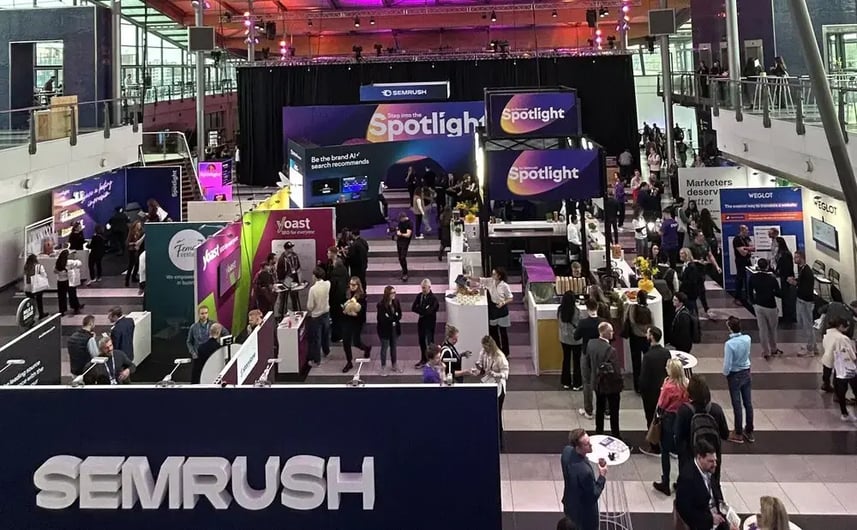
The prominence of AI at this event isn't surprising. AI's impact on Search Engine Optimisation has caused me conflicting emotions this past year. There's the anxiety of falling traffic and metrics that we've relied on for years no longer working as a good judgement of performance. There's the feeling of FOMO that we're not doing all we could be doing to address AI Search. There's the worry that what we are doing is not correct, because do we know enough yet on how AI Engines and LLM's think? But all of this is mixed with the excitement at the opportunity this new frontier represents, and how it's got stakeholders asking "what are we doing about our company's appearance in AI Engines?".
At Spotlight 2025, SEMRush's CMO, Andrew Warden, summed up the feeling in the room best when he called the launch of ChatGPT in November 2022, "the most disruptive event in the SEO industry since the creation of Google in 1998". Disruption can cause chaos, but it is also an opportunity. Warden argued that SEO teams should seize this opportunity to guide and measure the performance of a company's entire Digital Brand Visibility, and that's something I'm completely on board with. It's an idea that perfectly aligns with Huble's new Answer Engine Optimisation (AEO) Service and I come back from this trip energised and excited to be rolling it out for our clients.
Here are some other highlights and lessons learned from Spotlight 2025.
Which is it? AEO, GEO, AI SEO? Something else?
Andrew Warden also said: We've replaced, "let me Google that for you" with "let me ask AI for you".
But there's still no consensus on what optimising for this new channel should be called. Answer Engine Optimisation (AEO), Generative Engine Optimisation (GEO), AI Search Engine Optimisation (AI SEO), AI Visibility Optimisation (AIVO) and Large Language Model Optimisation (LLMO) were all options mentioned on the day. There are slight differences in the specifics for each, but they are seemingly being used interchangeably.
Personally, I think GEO has too much crossover with Geography and Geology related topics. So if you were planning on doing keyword research for topic cluster content around GEO, you're going to see the search volumes will be inflated and include lots of irrelevant variants.
At Huble, we've chosen to use "AEO" to describe our AI Optimisation Services so that it aligns with the terminology and tools within the HubSpot platform. We're HubSpot's Global Partner of the Year, so it makes sense for Huble to speak the same way HubSpot does.
However, I also liked the point made by Leigh McKenzie from SEMRush about why they are using the term AI SEO. Although there are certainly differences between targeting a search engine results page and an AI answer, the core fundamentals remain the same - great content that is understandable, relevant, trustworthy and solves the user's problem. And calling this field AI SEO makes it clear to organisations that an SEO team's knowledge and experience should be driving these AI strategies forward.
I do hope that the industry settles on a term eventually, but I think the fact it hasn't yet also shows just how early along this journey we all actually are.
We need to change how the impact of SEO is measured
James McCormick from IDC shared research that since March 2025, businesses have seen a 25% drop in organic traffic across the board. This decline is because of the completely new customer experience: users are having information brought directly to them instead, either in Google's AI Overviews, or through using ChatGPT, Gemini or other Answer Engines.
Another speaker described this as "a wake up call to businesses about the true value of their organic traffic". Because, historically many marketers were happy to see that a blog post was generating a good amount of organic traffic and calling it a success based only on that metric. One study showed that 78% of businesses still use clicks/traffic as their primary KPI for assessing the value of content.
I've spent the past decade working almost exclusively with companies that are using HubSpot to track leads, sales & revenue and feeding those insights back to marketing. So this statistic was a stark reminder to me that not every company has the software in place to effectively track conversions and align their marketing to the contacts data in their CRM.
Relying solely on “Traffic” as an indicator of content, marketing, and SEO effectiveness is no longer valid, especially if comparing performance to the pre-AI era. So it is now more important than ever to have a system in place like HubSpot to track the contacts generated by your content to help you understand how your content engages and influences users throughout their buyer's journey.
We also need a way to understand the performance of a website in AI Search, which means....
Investment is needed in new AEO tools and technology
When Huble engages new clients with SEO services, if they do not already have a SEO reporting tool in place, we ensure that this is built into the plan. It's a fundamental requirement for any SEO project that we can track KPI's like keyword rankings, clicks from organic search engines, the journey users take once they reach the website and then their journey through the CRM once they convert all the way to a sale. The ultimate goal is to be able to put a monetary value on the business that has been generated by the content we've optimised or created.
But even this advanced setup is not always providing the full picture. Tighter cookie tracking policies and user privacy preferences mean we do not always know how a conversion first came to the website. All of this is making the standard year-on-year comparisons less relevant, because we are not in the same landscape we were 12 months ago.
With this new frontier of AEO, there is the additional requirement of how to measure the way users interact with a company's brand, before they've even reached the website at all.
This is where AEO Tools come in:
- At Spotlight 2025, SEMRush One was announced, an all-in-one toolset enabling companies to combine their SEO and AEO reporting and research functions.
- Alongside this, HubSpot's AEO Grader tool gives us a general overview of a brand's performance in a particular region for a specific product, topic or industry. Further AEO Strategy tools were also announced as one of the many HubSpot product updates at Inbound 2025.
- SEMRush's AI Toolkit gives us additional insights using its database of billions of keywords to generate relevant prompts that users search, and can track visibility and sentiment for your brand on these topics.
- And then there are specialist technology vendors like ELELEM, who leverage their years of knowledge of how AI Engines think, to generate strategies on where your company can improve its AEO performance, and what can attributes content needs in order to be easily digested and cited by AI Engines.
If you want to learn more, we're running a webinar on November 20th with representatives from SEMRush, HubSpot and ELELEM to discuss the future of AI Visibility.
AEO tools and insights benefit your entire business
With additional software comes additional costs that need to be added to your marketing budget. AI tracking software is more expensive than basic keyword tracking, because the API requirements are more complex and the outputs are more detailed. SEMRush's Enterprise SEO suite of tools aims to give large companies not just insights on their brand, but allows them to set up tracking and campaigns at a product level - helping uncover specific consumer pain points or positive sentiment.
The additional overheads of all this new software may be off-putting, especially in today's current economic climate. But businesses need to look at these tools differently. They're not just for the SEO team to generate reports, they are a vital source of customer insights. An AEO visibility and sentiment report functions much like a continuous customer survey for your brand. It provides instant, actionable insights into how your company is being discussed online, across any topic and at any time. This enables you to receive valuable feedback in near real time, giving a comprehensive view of your brand perception.
With AEO tools, key insights can be surfaced to benefit all areas of your business. For example, gathering visibility and sentiment on one of your products can help identify FAQs on the product's specifications, or pain points and troubleshooting issues. These can be fed directly back to the product development and customer support teams to enhance their work. SEMRush's Andrew Warden described this new focus as "Digital Brand Visibility" and it being something that SEO can lead, but that all areas of a business can contribute to.
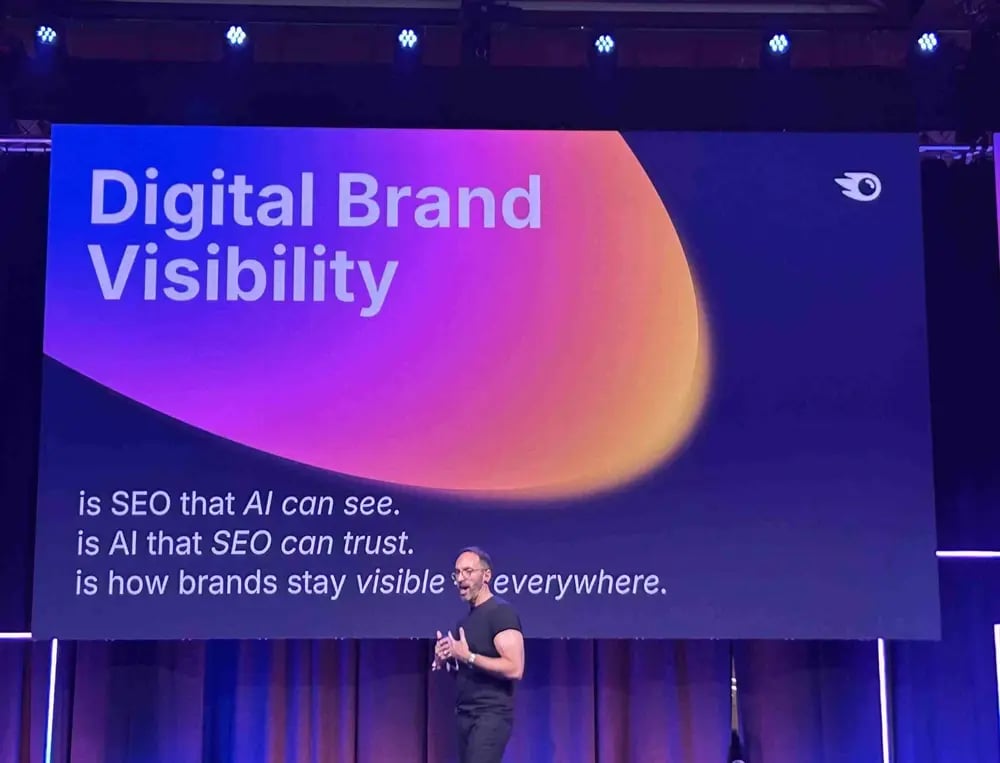
For that reason, the new AEO software budget should be considered as part of the budget for the overall company, not just the SEO team. And the insights gained from it need to be regularly distributed to the parts of your company that will find it most relevant, so that your business can evolve to meet the demands of its customers.
Content and AEO are intrinsically tied
A point made by Marcus Tober in his talk was that AI Engines value freshness at a much higher level than a traditional search engine. This is the answer SEO and content teams need to give to their stakeholders who have seen traffic numbers falling and are maybe questioning the value of content production in the age of AI. Content is still needed to feed AI its information. And if you're not controlling the narrative about your company, you'll be leaving it to others to tell it in their own words. Or, worse, your company won't be mentioned at all.
Google AI Mode is far better at weeding out Spam than ChatGPT
Studies showed that ChatGPT is citing spammy sites as the source of information rather than authoritative ones more often than Google's AI Mode. Recency bias and a less comprehensive way of measuring authority were two factors here. This isn't surprising: a typical Google search leverages decades of experience working out the most trustworthy and accurate sources of information about a brand or topic. This study potentially highlights how much more work ChatGPT still needs to do to be a fully trusted source of information.
In a separate talk, Tilman Harmeling from Usercentrics also showed a data analysis highlighting that users are comfortable to adopt AI, but they do not fully trust it yet, neither in the answers provided, nor the way personal information is being handled. The main lesson here is that if your analytics tools are showing poorer visibility on Gemini than ChatGPT, you have more work to do on building your brand's trust, credibility and authority. And due to each AI platform's machine learning working differently, you'll probably find each is citing different sources of information for its answers. Whilst it can be frustrating to see spammy sources used for citations instead of your well-written and researched one, I would expect that as each engine evolves, the better and more trustworthy content will rise to the top.
Where to start with AEO requires a slightly different approach to traditional SEO
When kicking off a new AEO strategy, the very first question to ask should be “what is AI saying about our business and where is that info coming from?”.
This is where tools mentioned above come in, and they will give you the necessary context for you know what your priority actions are:
If your brand awareness and visibility in Answer Engines is poor:
- Then your initial focus should be on increasing brand visibility and defining your niche.
- Next Steps: Brand Strategy, Content Creation, Local SEO, digital marketing, social media, backlink strategy, link building
If the reports show a poor sentiment and/or inaccurate information about your brand:
- Then your focus should be on correcting that.
- Next Steps: Brand Marketing, PR, updates to your website messaging, Schema Markup, product marketing, customer service, community management
If AI's are referencing your brand positively, accurately and visibility is good
- Then your focus is on amplifying your message,
- Next Steps: Paid media advertising, social promotion on Reddit, LinkedIn and YouTube etc.
Taking this approach is a great way to establish a proactive workflow, to tackle and improve your AI visibility and sentiment. No SEO team has infinite capacity, so it's important to identify the actions that are going to deliver the best results at the right time. And on that note, it's important to remember...
We're all still finding our way
The topic of Artificial Intelligence as a whole is fast-developing and evolving: it feels like every few days a new study, insight or technological development is announced. From the questions asked of the speakers, and the discussions I had with other attendees, it was clear that the majority of marketing and SEO professionals are feeling to some extent overwhelmed with uncertainty, and need help navigating what the best strategies are for their companies or clients.
We stand at the precipice of a new era of Search and Marketing. And it is reassuring to know that everyone else, to a great extent, is still trying to p things out. This is the message I'll be giving to the businesses I consult with on AEO and SEO: no-one has all the answers yet, but we can look to our knowledge of the past 2 decades of SEO experience to help guide our overall direction.
In summary:
- AEO and SEO tools are being launched and updated regularly - we need to use these to deepen our awareness of the overall performance of the brand and develop new strategies from this information.
- The foundations like technical SEO, metadata, sitemaps, keyword research and content optimisation are still important, but new considerations need to be made to ensure AI crawlers understand your content just as well as Search Engines do.
- Content Strategy is still key, but broader/top of funnel content is going to be less valuable now that the traffic it brings in is reduced. Instead we need to focus in on solving the pain points that your prospects and your customers face, to make their buyer's journey a smoother process, and ensure that your existing customers always have a positive experience too
- Reporting KPI's need a rethink - if you're only judging performance on organic traffic, you're missing out on the bigger picture
- To keep up with the competition, you will need to invest additional budget into SEO and AEO strategies or risk being left behind. But the insights gained can benefit your wider business, and so budgets should be drawn from a wider pool of resources.
- The landscape has been disrupted and is evolving fast. Investing in AEO now supports your immediate goals to turn declining traffic around, but it also encourages long-term growth in your brand visibility and customer engagement.
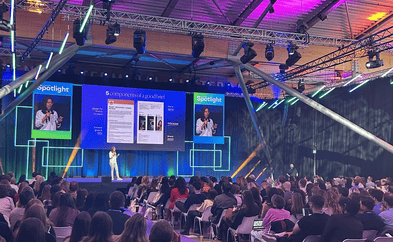
The Spotlight event as a whole helped reassure me that the approach to AEO we've been developing here at Huble this past year, aligns with the thinking of the industry at large. If you're interested in coming on this journey with us, get in touch.


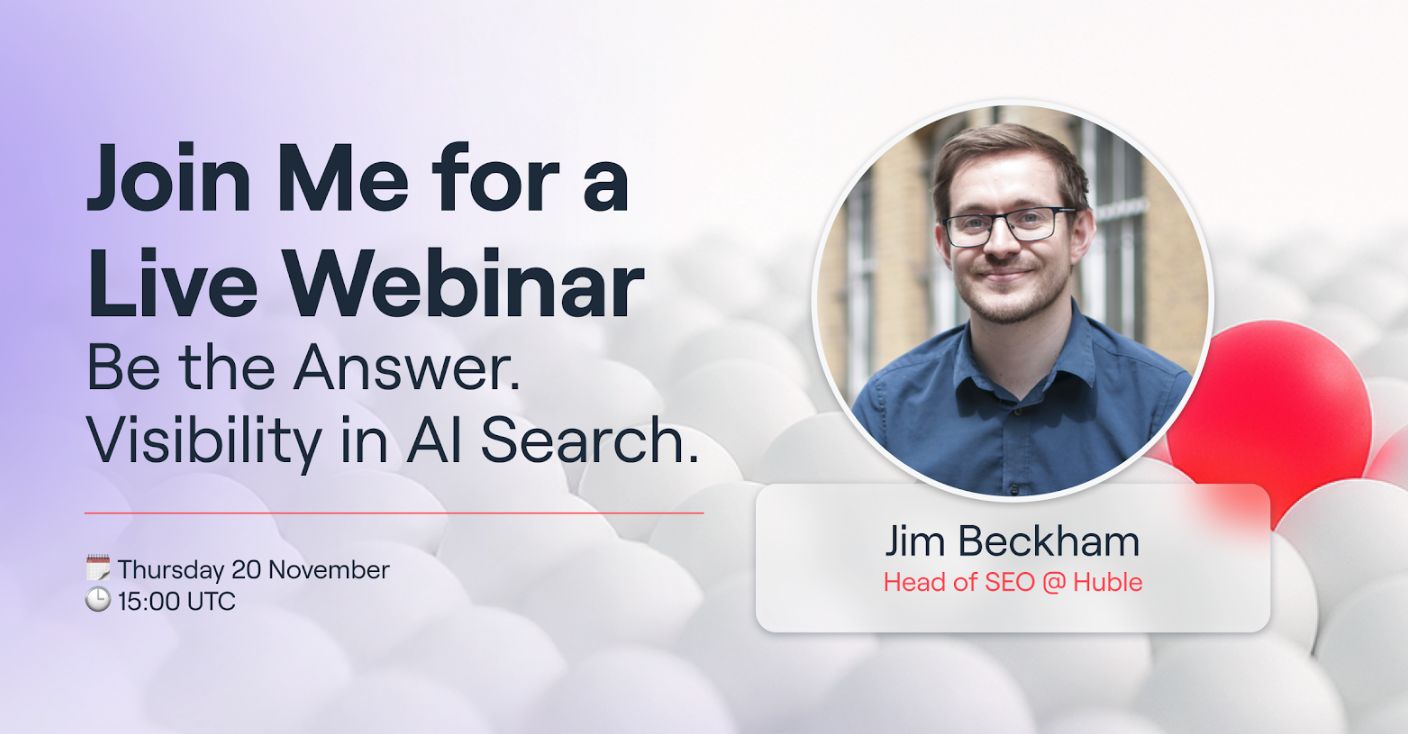
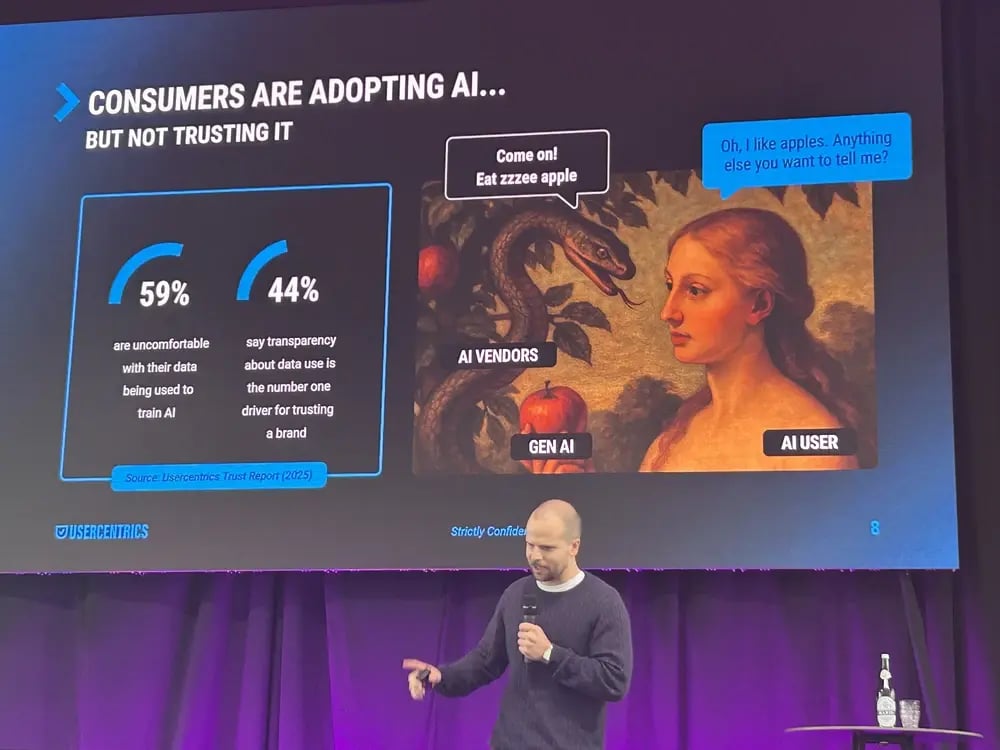









-3.png?width=500&height=320&name=Matt%20-%20imagery%20bank%20(8)-3.png)
